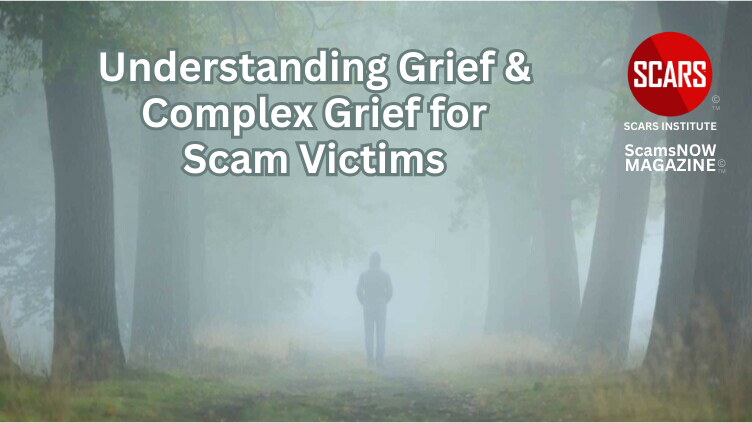Importance of Learning in Scam Victims Recovering from Scams
Scam Victim Recovery
Author:
• Tim McGuinness, Ph.D. – Anthropologist, Scientist, Director of the Society of Citizens Against Relationship Scams Inc.
Article Abstract
In this age, scams, including phishing, fraudulent investments, and relationship scams, pose a significant threat and scam victims pay the price.
The article stresses the need for awareness and education to prevent, detect, and recover from such crimes. Understanding and learning about the various scam forms, from email phishing to relationship scams, is vital for the recovery of scam victims, and to help them avoid scams in the future.
Education helps victims overcome self-blame and recover. Unraveling manipulation techniques, particularly in relationship scams, empower individuals to recognize and resist emotional exploitation. Victims of relationship scams face psychological trauma, and recovery involves building a support system and seeking professional counseling.
Rebuilding trust and addressing trauma is critical, and SCARS Support & Recovery Groups play a key role. Empowering through education, both pre and post-scam is essential to create a vigilant society. The article encourages scam victims to seek support, counseling, and education for recovery.
The Imperative of Understanding Scams and Empowering Scam Victims
Unfortunately, scam victims pay the price for the prevalence of every imaginable type of scam.
Whether in the form of phishing emails, fraudulent investments, or, more insidiously, relationship scams that demolish scam victim’s trust – in others and in themselves, the need for awareness and education is paramount to avoid these crimes, discover them in progress, and to fully recover from them.
The importance of learning about scams, their intricate workings, the manipulation techniques employed by scammers, and the psychological recovery journey for victims, especially those ensnared in relationship scams is critical.
Understanding Scams
To combat scams effectively, one must first comprehend their diverse forms. From classic email phishing to elaborate relationship scams or even combinational types like cryptocurrency investment scams, scammers exploit human vulnerabilities. Awareness is the first line of defense. Recognizing common scam tactics, such as urgency, fear, or promises of extraordinary gains, empowers individuals to question and investigate before falling prey.
Education is also an essential component in understanding so that victims can shed their self-blame, guilt, and shame and allow themselves to recover from their scams.
Understand This!
- You are a survivor – you can make it through this process and recover!
- It was not your fault – these criminals exploited your vulnerabilities, manipulated and controlled you to get what they wanted!
- You are not alone – SCARS is here along with our communities for fellow scam victims-survivors to help you through your recovery from this terrible experience!
- Axios – no matter what you think, you are worthy of being helped and we are here to help you!
Unraveling the Manipulation Techniques
Scammers excel at psychological manipulation, particularly in relationship scams. Understanding the tactics they use to exploit emotions – trust, love, fear – is crucial. By feigning affection, creating a false sense of urgency, or even threatening harm, scammers manipulate victims into making irrational decisions. Awareness of these tactics serves as armor, fostering resilience against emotional exploitation.
The Psychology of Recovery for Relationship Scam Victims
The aftermath of falling victim to a relationship scam can be devastating. Victims often grapple with shame, guilt, and profound emotional & psychological trauma. Recognizing the psychological impact is the first step towards recovery. Establishing a support system, through SCARS Support & Recovery Groups, friends, family, and professional counselors, is vital. Victims must understand that they are not alone, and seeking help is a sign of strength.
Rebuilding Trust
One of the significant challenges for scam victims, particularly in relationship scams, is rebuilding trust. Betrayed by someone they thought cared for them, victims may become skeptical of genuine connections. Patience, self-reflection, and seeking healthy relationships are essential in the journey toward rebuilding trust. SCARS Support & Recovery Group communities help rebuild real connections between survivors who share common experiences.
Addressing Trauma
Victims of relationship scams often experience profound emotional trauma. Understanding that healing is a process and seeking professional counseling can be transformative. Therapeutic approaches, such as cognitive-behavioral therapy, can aid victims in coping with the emotional aftermath, fostering resilience and preventing long-term psychological scars.
SCARS is not a mental healthcare provider but is trauma-informed care certified to help scam victims overcome their experience through learning, support, and advocacy.
Empowering Through Education
Prevention is undeniably the best cure when it comes to scams. Educational initiatives, both formal and informal, can empower individuals to recognize red flags, question suspicious activities, and report scams. Government agencies, non-profit organizations, and educational institutions play pivotal roles in disseminating information and fostering a culture of vigilance.
However, it is just as important after the scam ends, since this can help prevent another scam, but also to enable complete understanding about why it was not the victim’s fault and how to move forward.
Remember
As scams continue to evolve in sophistication, so must our collective defense mechanisms. Learning about scams, understanding their intricacies, recognizing manipulation techniques, and supporting victims in their recovery are crucial elements of this defense. By fostering awareness and promoting education, we can build a resilient society that navigates the digital landscape with confidence and security.
Sign up for SCARS Scam Victims’ Support & Recovery Groups
Every scam victim can recover from this experience – it is your responsibility to make sure that you are one of them.
Sign up for SCARS groups by visiting support.AgainstScams.org
Our team will walk you through the process of determining what the best solution is for each victim.
Trauma Counseling
SCARS recommends that every scam victim obtain trauma counseling or therapy to help them effectively recover from these crimes. There is no shame in asking and accepting help, the only shame is in not getting help when you need it.
You can find a counselor or therapist in our directories at counseling.AgainstScams.org
SCARS also offers a very low-cost membership that includes a counseling/therapy benefit through our partners. Learn more about this at membership.AgainstScams.org
Begin Learning
The learning journey starts are RomanceScamsNOW.com and ScamsNOW.com where there is the largest collection of knowledge about what these crimes are, how they work, who the criminals are, and how to recover from them!
Please Report the Crime
Reporting may be difficult but it is absolutely necessary. To learn where and how go to reporting.AgainstScams.org
-/ 30 /-
What do you think about this?
Please share your thoughts in a comment below!
-/ 30 /-
What do you think about this?
Please share your thoughts in a comment below!
SCARS LINKS: AgainstScams.org RomanceScamsNOW.com ContraEstafas.org ScammerPhotos.com Anyscam.com ScamsNOW.com
reporting.AgainstScams.org support.AgainstScams.org membership.AgainstScams.org donate.AgainstScams.org shop.AgainstScams.org
youtube.AgainstScams.org linkedin.AgainstScams.org facebook.AgainstScams.org
TABLE OF CONTENTS
- Scam Victim Recovery
- Article Abstract
- The Imperative of Understanding Scams and Empowering Scam Victims
- Understanding Scams
- Understand This!
- Unraveling the Manipulation Techniques
- The Psychology of Recovery for Relationship Scam Victims
- Rebuilding Trust
- Addressing Trauma
- Empowering Through Education
- Remember
- Sign up for SCARS Scam Victims’ Support & Recovery Groups
- Trauma Counseling
- Begin Learning
- Please Report the Crime
CATEGORIES
![NavyLogo@4x-81[1] Importance of Scam Victims' Learning in Recovery from Scams 2024](https://scamsnow.com/wp-content/uploads/2025/04/NavyLogo@4x-811.png)
ARTICLE META
Important Information for New Scam Victims
- Please visit www.ScamVictimsSupport.org – a SCARS Website for New Scam Victims & Sextortion Victims.
- SCARS Institute now offers its free, safe, and private Scam Survivor’s Support Community at www.SCARScommunity.org – this is not on a social media platform, it is our own safe & secure platform created by the SCARS Institute especially for scam victims & survivors.
- SCARS Institute now offers a free recovery learning program at www.SCARSeducation.org.
- Please visit www.ScamPsychology.org – to more fully understand the psychological concepts involved in scams and scam victim recovery.
If you are looking for local trauma counselors, please visit counseling.AgainstScams.org
If you need to speak with someone now, you can dial 988 or find phone numbers for crisis hotlines all around the world here: www.opencounseling.com/suicide-hotlines
Statement About Victim Blaming
Some of our articles discuss various aspects of victims. This is both about better understanding victims (the science of victimology) and their behaviors and psychology. This helps us to educate victims/survivors about why these crimes happened and not to blame themselves, better develop recovery programs, and help victims avoid scams in the future. At times, this may sound like blaming the victim, but it does not blame scam victims; we are simply explaining the hows and whys of the experience victims have.
These articles, about the Psychology of Scams or Victim Psychology – meaning that all humans have psychological or cognitive characteristics in common that can either be exploited or work against us – help us all to understand the unique challenges victims face before, during, and after scams, fraud, or cybercrimes. These sometimes talk about some of the vulnerabilities the scammers exploit. Victims rarely have control of them or are even aware of them, until something like a scam happens, and then they can learn how their mind works and how to overcome these mechanisms.
Articles like these help victims and others understand these processes and how to help prevent them from being exploited again or to help them recover more easily by understanding their post-scam behaviors. Learn more about the Psychology of Scams at www.ScamPsychology.org
SCARS INSTITUTE RESOURCES:
If You Have Been Victimized By A Scam Or Cybercrime
♦ If you are a victim of scams, go to www.ScamVictimsSupport.org for real knowledge and help
♦ SCARS Institute now offers its free, safe, and private Scam Survivor’s Support Community at www.SCARScommunity.org/register – this is not on a social media platform, it is our own safe & secure platform created by the SCARS Institute especially for scam victims & survivors.
♦ Enroll in SCARS Scam Survivor’s School now at www.SCARSeducation.org
♦ To report criminals, visit https://reporting.AgainstScams.org – we will NEVER give your data to money recovery companies like some do!
♦ Follow us and find our podcasts, webinars, and helpful videos on YouTube: https://www.youtube.com/@RomancescamsNowcom
♦ Learn about the Psychology of Scams at www.ScamPsychology.org
♦ Dig deeper into the reality of scams, fraud, and cybercrime at www.ScamsNOW.com and www.RomanceScamsNOW.com
♦ Scam Survivor’s Stories: www.ScamSurvivorStories.org
♦ For Scam Victim Advocates visit www.ScamVictimsAdvocates.org
♦ See more scammer photos on www.ScammerPhotos.com
You can also find the SCARS Institute’s knowledge and information on Facebook, Instagram, X, LinkedIn, and TruthSocial
Psychology Disclaimer:
All articles about psychology and the human brain on this website are for information & education only
The information provided in this and other SCARS articles are intended for educational and self-help purposes only and should not be construed as a substitute for professional therapy or counseling.
Note about Mindfulness: Mindfulness practices have the potential to create psychological distress for some individuals. Please consult a mental health professional or experienced meditation instructor for guidance should you encounter difficulties.
While any self-help techniques outlined herein may be beneficial for scam victims seeking to recover from their experience and move towards recovery, it is important to consult with a qualified mental health professional before initiating any course of action. Each individual’s experience and needs are unique, and what works for one person may not be suitable for another.
Additionally, any approach may not be appropriate for individuals with certain pre-existing mental health conditions or trauma histories. It is advisable to seek guidance from a licensed therapist or counselor who can provide personalized support, guidance, and treatment tailored to your specific needs.
If you are experiencing significant distress or emotional difficulties related to a scam or other traumatic event, please consult your doctor or mental health provider for appropriate care and support.
Also read our SCARS Institute Statement about Professional Care for Scam Victims – click here
If you are in crisis, feeling desperate, or in despair, please call 988 or your local crisis hotline – international numbers here.
More ScamsNOW.com Articles
A Question of Trust
At the SCARS Institute, we invite you to do your own research on the topics we speak about and publish. Our team investigates the subject being discussed, especially when it comes to understanding the scam victims-survivors’ experience. You can do Google searches, but in many cases, you will have to wade through scientific papers and studies. However, remember that biases and perspectives matter and influence the outcome. Regardless, we encourage you to explore these topics as thoroughly as you can for your own awareness.
























![scars-institute[1] Importance of Scam Victims' Learning in Recovery from Scams 2024](https://scamsnow.com/wp-content/uploads/2025/04/scars-institute1.png)

![niprc1.png1_-150×1501-1[1] Importance of Scam Victims' Learning in Recovery from Scams 2024](https://scamsnow.com/wp-content/uploads/2025/04/niprc1.png1_-150x1501-11.webp)